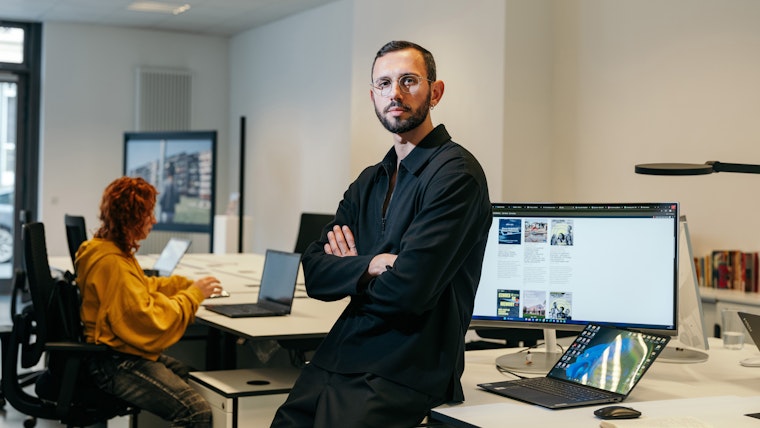
Petro Rusanienko: Remembering Home
Actor’s Journey from Loss to Memory
Petro Rusanienko is from Donbas, eastern Ukraine, a city, he says, of rubble, of no life, a city under Russian occupation. When war came to Donbas in 2014, Rusanienko left for Kyiv and built a beautiful career on stage and screen. “I worked in theaters and films, got my bachelor’s as an actor, became quite famous in my country, working in the best theaters in Ukraine.”
He paid a heavy price, however, for that glory. Rusanienko, who is gay, played a gay Roma man in a short film that won international recognition but cost him his community. “The film became incredibly popular. It was in all Ukrainian media,” he recalls. But conservative members of the community thought he portrayed Roma in the wrong way. “My Roma friends broke communication with me because if they didn’t, it meant they supported the film,” he says. He understood, but it hurt. He ended up fleeing the country for Budapest where he entered the gender studies program at the Central European University, and shortly after he returned to Kyiv, the Russians invaded Ukraine. Once again, he fled, this time to Berlin.
He’d been to Berlin before with a short film he co-directed about the Roma genocide in World War II in Ukraine. “I presented it in Berlin, right next to the Brandenburg Gate,” he says. “I was so proud. So many horrible things happened through this gate—so many people forced to move toward death—and I was presenting the movie in this place.”
“Maybe all these losses push me to remember—to make sure our stories don’t disappear.”
— Petro Rusanienko
He didn’t even know there was a Holocaust against the Roma until he was 24. “I believe the consciousness changed in Ukraine. A quantum jump happened when Ukraine turned toward Europe.” Suddenly, if they wanted EU accession, they had to adopt a strategy for minorities, defending their rights in the media and public, and putting them in the school curriculum.
Starting over in Berlin was hard, but Rusanienko has found at the European Roma Institute for Arts and Culture (ERIAC) a place where his artistic and community work intersect. “I was responsible to create the visual side of a research project about the Roma during the war. The situation obviously became even worse for them,” he says. “In a difficult situation, the most vulnerable are the minorities.”
Millions of people moved to the western part of Ukraine because of the war. Everyone needed housing. “People didn’t want to rent apartments to Roma families. They said, ‘if you give it to a family of four, they will bring 40.’”
He remembers the strange national joke that followed a real incident. “Roma people stole a tank from Russia,” he says. “It was a huge joke—‘Our Roma protected us, they are on our side.’ But at the same time, it strengthened the stereotype that Roma steal. It was very conflicting. They said, ‘We are proud of our Roma,’ but they were pushing the stereotype even more.”

Through another campaign at the institute, Rusanienko helped highlight the Roma soldiers fighting in Ukraine’s army. “We did interviews with Roma soldiers to show that we are among the soldiers. It’s really important because for Ukraine the soldier is the most important person—the protector of the country.”
Rusanienko’s own family has scattered not just geographically but mentally. “I brought my mom to Berlin. Before she was in Israel. My brother is in Israel, one sister is in Budapest, another is in Luhansk under occupation, and one sister is in Russia—brainwashed by Putin. We had to break relations. Maybe we will rebuild. I don’t know.”
Donbas was occupied on December 31, 2024. “On the first of January I knew my city was under another flag. That was probably the second most painful thing that happened to me—the first was when my father passed away.”

“My father experienced that real Roma lifestyle you see in films, traveling with the horses and big families across the Soviet Union. It sounds romantic, but it wasn’t great to grow up like that.” Rusanienko’s father married a non-Roma woman, settled down, and tried to keep Rusanienko and his siblings away from the Roma community. “I traveled a lot to my Roma family in Russia, so I was familiar with the community, but I couldn’t speak Romani. It was clear my father didn’t want me to grow into this identity.” Only later did Rusanienko meet beautiful people and beautiful teachers, he says, who helped him not only pay attention to his identity and roots but embrace them as unique.
He produces a podcast supported by a German foundation to re-think the memory of World War II. “We talk with young people to get their thoughts and perspectives on how to make the Roma Holocaust more public.”
Looking back, he sees how identity, exile, and history keep folding into one another. “Maybe all these losses push me to remember—to make sure our stories don’t disappear.”






